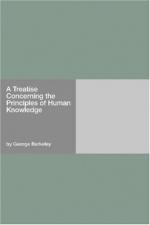91. Sensible qualities real.—It were a mistake to think that what is here said derogates in the least from the reality of things. It is acknowledged, on the received principles, that extension, motion, and in a word all sensible qualities have need of a support, as not being able to subsist by themselves. But the objects perceived by sense are allowed to be nothing but combinations of those qualities, and consequently cannot subsist by themselves. Thus far it is agreed on all hand. So that in denying the things perceived by sense an existence independent of a substance of support wherein they may exist, we detract nothing from the received opinion of their reality, and are guilty of no innovation in that respect. All the difference is that, according to us, the unthinking beings perceived by sense have no existence distinct from being perceived, and cannot therefore exist in any other substance than those unextended indivisible substances or spirits which act and think and perceive them; whereas philosophers vulgarly hold that the sensible qualities do exist in an inert, extended, unperceiving substance which they call Matter, to which they attribute a natural subsistence, exterior to all thinking beings, or distinct from being perceived by any mind whatsoever, even the eternal mind of the Creator, wherein they suppose only ideas of the corporeal substances created by him; if indeed they allow them to be at all created.
92. Objections of atheists overturned.—For, as we have shown the doctrine of Matter or corporeal substance to have been the main pillar and support of Scepticism, so likewise upon the same foundation have been raised all the impious schemes of Atheism and Irreligion. Nay, so great a difficulty has it been thought to conceive Matter produced out of nothing, that the most celebrated among the ancient philosophers, even of those who maintained the being of a God, have thought Matter to be uncreated and co-eternal with Him. How great a friend material substance has been to Atheists in all ages were needless to relate. All their monstrous systems have so visible and necessary a dependence on it that, when this corner-stone is once removed, the whole fabric cannot choose but fall to the ground, insomuch that it is no longer worth while to bestow a particular consideration on the absurdities of every wretched sect of Atheists.
93. And of fatalists also.—That impious and profane persons should readily fall in with those systems which favour their inclinations, by deriding immaterial substance, and supposing the soul to be divisible and subject to corruption as the body; which exclude all freedom, intelligence, and design from the formation of things, and instead thereof make a self—existent, stupid, unthinking substance the root and origin of all beings; that they should hearken to those who deny a Providence, or inspection of a Superior Mind over the affairs of




